Where Are the Disappeared Women of the Theatre?
Tara Derrington scribbled her question on the back of one of her daughter’s paintings. She woke at 3 A.M. with it spinning in her mind. That day in November 2015, Tara joined close to 600 women at a rally in Dublin for Waking the Feminists (WTF) to fight for gender equality on the stage. She attended alone after the event proved inaccessible to many of her colleagues due to scheduling. Standing solo, photographers snapped the image of Tara holding the sign she had made with her question in thick, black ink: “Where are the disappeared women of the Arts? At the school gates now.” And thus began the dialogue that is revolutionizing representation for professional female artists with children across the Irish theatrical platform. That day, the rally that received international attention gave birth to a new movement: Mothers Artists Makers (MAM), a multi-regional collective of feminist mothers in Irish theatre with children, women who feel disenfranchised from the theatre as an art form and community. The conversation has grown so relevant that by September 2016, MAM was performing on the national stage in a devised work commissioned by the Abbey Theatre in direct response to one of theatre’s season productions. When I interviewed three members of MAM’s Steering Committee, I learned in detail some of the powerful stories behind what started with a sign and grew to a professionally recognized performance piece and movement in Ireland—in just under six months.
When [Tara Derrington] became pregnant with her second child, the financial and logistical challenges of childcare … eliminated theatre work as an option. She… ‘embraced the opportunity to parent’—or as founding member Fiona Brown would put it, ‘made peace with moving away from one’s art.’
Now one of MAM’s founders, Tara arrived in Ireland in the late 1990s after her theatre training in England. She quickly found success directing interactive theatre and started her own company. After having her first child and becoming a single parent soon after, her work became more selective and more intimate. But she persisted, saying she “continued in spite of the divided commitment” commonly felt by working mothers, especially in the arts. When she became pregnant with her second child, the financial and logistical challenges of childcare with no support system eliminated theatre work as an option altogether. She was done. She evaluated her life and “embraced the opportunity to parent”—or as founding member Fiona Brown would put it, “made peace with moving away from one’s art.” Almost a decade after her moment of resignation, Tara describes attending the first WTF rally as her “first great moment of empowerment and change.” It allowed her to see herself once again “in the context of theatre.”
After attending the second WTF rally with five other women, Tara organized what would become the first meeting of MAM. The group of women shared their theatre backgrounds, stories of isolation, resignation, and fury over lack of resources. For many of them, it was the first time anyone wanted to know who they were as artists, where they were in relationship to their art, and what was holding them back in terms of their artistic role in society. The meeting confirmed for everyone present that women were excluded from the theatre because of their gender and the complete lack of resources that would allow caregivers to stay involved in the arts. It was not a meeting of those sour on theatre, as Tara wrote in a piece for WTF, but those who longed for it, who had been torn away with no way back.
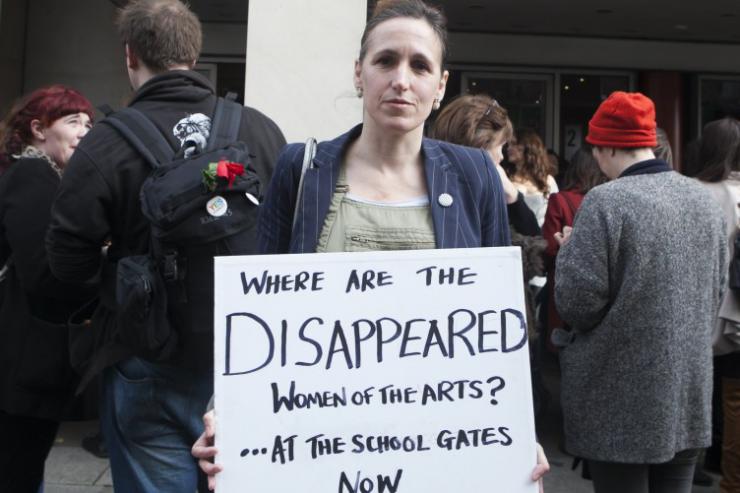
Mentored early on at their second meeting by Michelle Brown, founder of The Mothership Project—Ireland’s network for visual artists and art workers who are parents—MAM received the first advice that would become protocol: “If you feel invisible, meet in places that make you feel visible.” Powerful letters with signatures went out from MAM to theatre companies requesting space, and to MAM’s surprise, received a warm welcome in response. Second, in each space MAM members brought a basket of toys for the theatre to use whenever family artists or theatre practitioners entered the property. Third, a “Cuppa” became the term for theatre artist-mothers’ gatherings that meet every two weeks for support and networking.
In April, Sarah FitzGibbon joined MAM as both mother and professional theatre artist working as education consultant to The Abbey Theater. Sarah’s own childhood revolved around family-integrated theatre. Her mother is Emelie FitzGibbon, founder and artistic director of Ireland’s Graffiti Theatre Company, and the work has been her livelihood since the 1980s. Sarah and her brother grew up in the rehearsal room, and she describes their presence as completely natural, unobtrusive, and even beneficial. With a degree in sociology and pedigree in theatre, Sarah’s passion and profession ties social exclusionary issues to creating pieces for The Abbey’s educational program. She mentioned that theatres should at least care about the loss of revenue the exclusion of mothers generates, not to mention the reductive work that comes from underrepresenting the population and its lifestyles.
Of Ireland’s female population, over 54 percent are mothers. The theatre’s inability to accommodate professionals and engage mothers not only reduces its talent in terms of contributors, but also cuts off a huge portion of potential audience members.
Founding member and actress Susie Lamb calls the current narrow view of women and mothers presented onstage a “form of censorship.” Of Ireland’s female population, over 54 percent are mothers. With those numbers, the theatre’s inability to accommodate professionals and engage mothers not only reduces its talent in terms of contributors, but also cuts off a huge portion of potential audience members. Sarah identified the primary obstacles facing professional theatre artists who are mothers as unaffordability and lack of access to childcare, exclusion of children in the rehearsal and performance space, and lack of “pathways back in” to the professional network for professionals who take maternal time. All of this, she says, comes from the bias, or ignorance behind the table. Referring to their awareness efforts, she said:
You can hear a collective gulp when this topic comes up among theatre administrators. I call it “falling off the invitation list,” where a mother won’t be considered just because she’s had a child. A theatre will excuse their exclusion by saying, “she has a family,” as if that’s reason enough to scratch her off. It perpetuates a cycle of invisibility.
MAM’s efforts to make women visible materialized in a devised work commissioned by and performed at The Abbey Theatre. Observe the Mothers of Theatre Marching Towards the Stage presented an all-female ensemble with a final guest appearance by marching children in direct response to The Abbey’s season production of Frank McGuinness’s Observe the Sons of Ulster Marching Towards the Somme. In the same year that The Abbey Theatre committed to an eight-step gender equality initiative, a main stage production featuring eight male characters stomped its way onto the stage. In response and through a series of connections, MAM successfully networked with The Abbey and got the go ahead on a production.
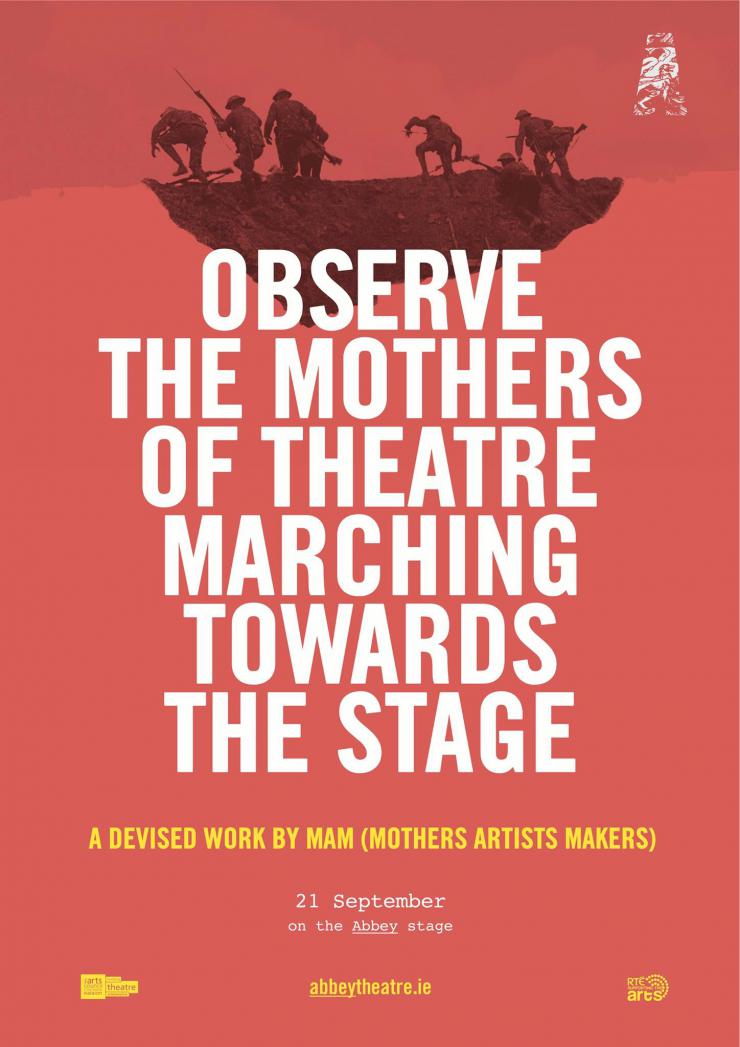
With six workshops in six weeks, over forty women and children gathered to create the devised work. In rehearsal they set a play area, allowing the children, ranging from three months to fifteen years, to come and play. “We also told them we would love for them to join and contribute if they’d like,” Tara added. One fifteen-year-old boy became their official marching instructor, researching the military dramaturgy and teaching the MAMs proper marching technique and protocol. Tara had only one requirement for the mothers: “It’s about making whatever you can make … Do not let the obstacles that have stopped you before stop you from doing this.”
Participants would direct, act, and provide dramaturgy according to their skills and passions. Everyone participated on stage. They took four sections from McGuinness’s work and explored its themes, adding mother to soldier, war, loyalty, identity, heroism, and sacrifice. As chaos developed into craft, the women began discovering for themselves how perfectly motherhood belonged in the context of a battlefield.
Kate Harris was one of those women on stage. Originally from Portland, Oregon, she describes Ireland’s one-degree of separation community as prime, intimate conditions to ignite change quickly. “I was just a hippie from Portland with a passion for theatre that made a difference.” After getting sick of New York during her performing arts education early on, she grabbed an available visa to Ireland and stayed. “My journey with MAM went in reverse,” she commented, “having children is what made me realize that I needed to make theatre myself after years of just facilitating, but there was no clear way back in.” When Kate attended a presentation by the National Women’s Council of Ireland with her baby in tow, she was welcomed to mingle, partake in refreshments, and view from the back with a caveat—to step out when the minister began speaking. Happy just to be welcomed, Kate obliged. It wasn’t until she heard the minister mention the issue of childcare keeping women outside the walls that she realized she had been complicit in her own ousting for that very reason. She snapped a quick selfie of the irony. Finding support from MAM, she wrote a letter to the National Women’s Council of Ireland (NWCI). Receiving little to no admission or apology from NWCI, she penned an essay of her “involuntary political act,” addressing a topic now crucial to MAM’s mission: the division of women within feminism in regard to motherhood and the need to unite in order to better fight inequality. With MAM, Kate says she “found her tribe” and the opportunity to create theatre without having to divide her focus was a chaotic, messy, welcome opening.
The piece at The Abbey echoed much of Kate’s own conscious focus on being essentialist about motherhood. In rehearsal, the kids were present, but she is quick to identify that “it was about the work.” She experienced firsthand in rehearsal a connection she always felt between motherhood and the theatre—a philosophy that lines up with the WTF’s cry, the belief that “diversity improves the [theatrical] environment dramatically.” Connecting much of MAM’s piece was a recreated “bridge scene” from McGuinness’s play. In the original work, two soldiers are on a bridge, one injured and the other pleading with him to find strength, rise, and keep moving. In MAM’s devised creation, one mother lies injured, unable to rise, while another begs her to find strength, rise, and continue moving forward. The MAM scene revealed struggle with post-natal depression, in which a woman without the strength to lift her own child is lifted by a fellow mother-soldier. It was a direct challenge to the exclusive use of warrior themes for the male gender. After performing the scene in rehearsal, the room of artist mothers stood first in stunned silence then gave in to animated dialogue.
At the close of the piece, the ensemble of children joined the women on stage. Each woman stepped forward, some with babies strapped on their bodies, said her mother-soldier name to the audience, and whether she volunteered, or was conscripted into motherhood. At the panel that followed the performance, the audience expressed a wide range of emotion, from thanking the women for naming depression boldly to remarking with pleasure how revolutionary it was to see live breastfeeding onstage as a natural act in a scene. Women onstage shouting “We will not surrender!” shattered the tired silly-mother trope, obliterated a typically male-dominated work, and exposed a lifestyle often reduced to side characters, or aging grandmothers. In MAM’s work, the woman warrior on stage used her body to fight, organize, sacrifice, save, and sustain life. Social media erupted with gratitude and awe, including from The Abbey Theatre’s own director Graham McLaren, who called the piece “Brilliant, Brave, Beautiful, Honest, and very, very, necessary.”
First production in the books, MAM now has detailed dreams for the future. In addition to meeting publicly and providing networking and artistic support, they want to curate grants and generate government support for theatre artist childcare, advocate for an artist in residence in every department, develop family-friendly studio space to make work with children welcome, and create plans for their own symposium. More performances will come as well. Their current fight for family-conscious scheduling has met with great success. By writing multiple letters signed by members, MAM requested for the next WTF event time to move away from the schoolyard pickup hour—the original obstacle preventing Tara’s friends and women from all over the country from attending the first two WTF rallies. WTF listened and has since changed the time. This willingness to adjust exemplifies the collaboration MAM argues is necessary for the feminist movement to remain accessible to women of all lifestyles. Sarah FitzGibbon describes the movement as having small boots, but taking big strides—a perfect description for women who are mothers to both human children and a revolution. Perhaps mothers understand better than anyone the possibility of tiny creations evolving quickly into unstoppable forces, and that's what makes believing in their cause a thrill to investigate and support. This small theatre movement is growing fast under mothers' care, and has proven a crucial and effective voice in the fight for gender equality.

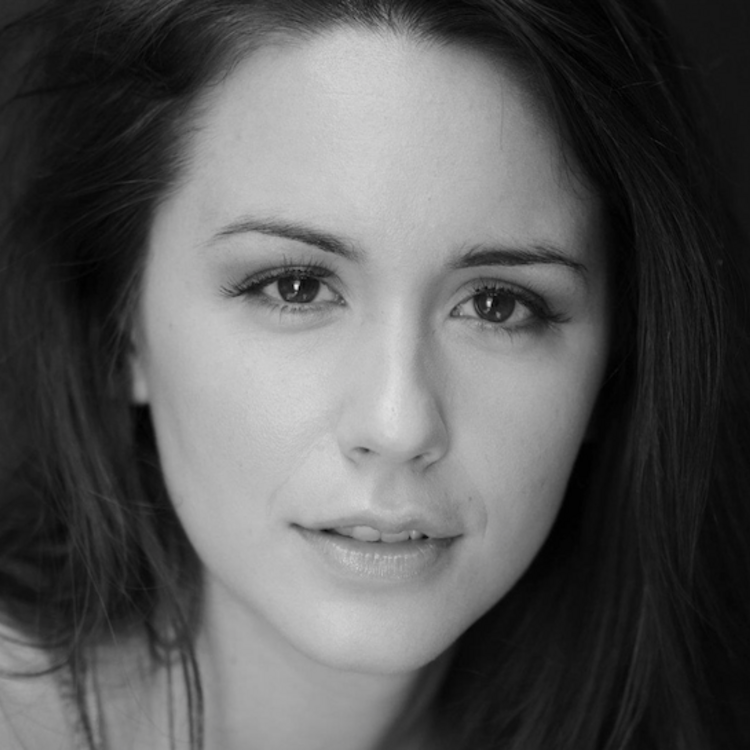
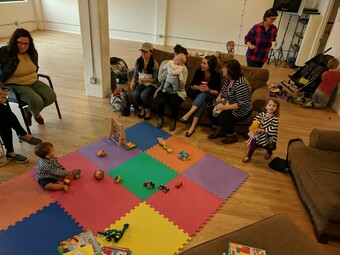

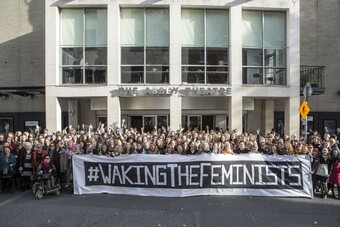

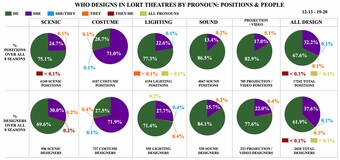

Comments
The article is just the start of the conversation—we want to know what you think about this subject, too! HowlRound is a space for knowledge-sharing, and we welcome spirited, thoughtful, and on-topic dialogue. Find our full comments policy here
Thank you for this, Rachel. It is a vital conversation.
As an artist and mother, this article resonated with me deeply. As a company owner, I have consciously built bridges with my husband/co-founder back in (and out when parenting needs to take the lead) that others do not have, yet.
This piece reminded me of the work to be done within larger institutions. Thank you!
Jess, I couldn't agree more. These women are revolutionary and powerfully relevant, as are your efforts. Thank you so much for creating avenues and pathways within your company - leaders like you and your husband are necessary for exemplifying progressive practice. I'm hoping larger institutions learn to follow your example.